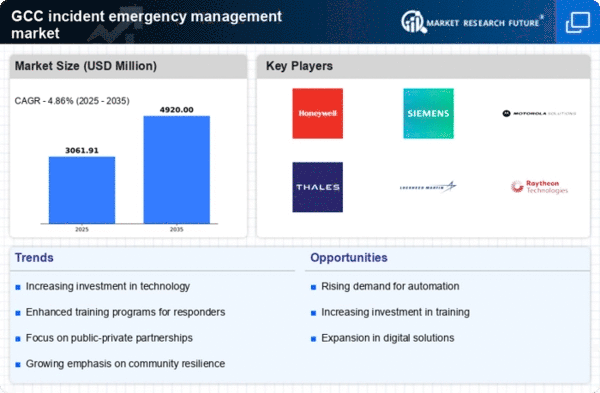Increasing Urbanization
The rapid urbanization in the GCC region is a crucial driver for the incident emergency-management market. As cities expand, the complexity of managing emergencies escalates. Urban areas are densely populated, which increases the potential impact of incidents. The GCC countries are witnessing a surge in population, with urban areas expected to accommodate over 80% of the total population by 2030. This demographic shift necessitates advanced emergency management systems to ensure public safety. The incident emergency-management market is projected to grow significantly, with an estimated CAGR of 7.5% from 2025 to 2030, driven by the need for effective response strategies in urban settings. The integration of smart technologies in urban planning further emphasizes the importance of robust emergency management frameworks.
Investment in Infrastructure
The GCC region is experiencing substantial investments in infrastructure development, which serves as a significant driver for the incident emergency-management market. Governments are allocating billions of $ towards enhancing transportation, healthcare, and public safety infrastructure. For instance, the UAE has committed over $100 billion to improve its infrastructure by 2030. This investment not only aims to boost economic growth but also to enhance the resilience of communities against emergencies. The incident emergency-management market is likely to benefit from these developments, as improved infrastructure facilitates quicker response times and more efficient resource allocation during incidents. Furthermore, the integration of advanced technologies in infrastructure projects is expected to enhance the capabilities of emergency management systems.
Rising Awareness of Safety Protocols
There is a growing awareness of safety protocols among the public and organizations in the GCC, which is driving the incident emergency-management market. Increased media coverage of emergencies and disasters has heightened public consciousness regarding safety measures. As a result, businesses and government entities are investing in training programs and emergency preparedness initiatives. The market for incident emergency-management solutions is projected to expand as organizations seek to comply with safety regulations and enhance their emergency response capabilities. This trend is reflected in the increasing demand for training services, which is expected to grow by 10% annually through 2025. The emphasis on safety culture within organizations is likely to lead to more comprehensive emergency management strategies.
Climate Change and Environmental Risks
The impact of climate change and associated environmental risks is emerging as a significant driver for the incident emergency-management market in the GCC. The region is experiencing increased frequency and intensity of extreme weather events, such as floods and heatwaves. This trend necessitates the development of robust emergency management strategies to mitigate the effects of such incidents. Governments are recognizing the need for comprehensive disaster risk reduction frameworks, which are likely to lead to increased investments in the incident emergency-management market. The market is projected to grow as stakeholders seek to implement adaptive measures and enhance resilience against climate-related emergencies. This focus on environmental risks underscores the importance of proactive emergency management planning.
Technological Integration in Emergency Services
The integration of advanced technologies in emergency services is a pivotal driver for the incident emergency-management market. Technologies such as artificial intelligence, big data analytics, and IoT are being increasingly adopted to enhance emergency response capabilities. In the GCC, governments are investing in smart city initiatives that incorporate these technologies to improve public safety. For example, the use of drones for surveillance and real-time data collection is becoming more prevalent. This technological shift is expected to enhance situational awareness and decision-making during emergencies. The incident emergency-management market is anticipated to grow as organizations seek to leverage these technologies to optimize their response strategies and improve overall efficiency.
















